Book contents
- Frontmatter
- Studies in Medievalism
- Acknowledgments
- Contents
- List of Illustrations
- Preface
- I Essays on Politics and Medievalism (Studies)
- Historical Malapropism and the Medieval Blood Libel in American Politics
- Putin’s Medieval Weapons in the War against Ukraine
- The Battle of Tours and the US Southern Border
- Medievalism, Brexit, and the Myth of Nations
- An Arthur for the Brexit Era: Joe Cornish’s The Kid Who Would be King
- II Other Responses to Medievalism
- Angle-ing for Arthur: Erasing the Welsh in Guy Ritchie’s King Arthur: Legend of the Sword
- Chasing Freyja: Rape, Immigration, and the Medieval in Alt-Right Discourse
- “Things painted on the coarse canvas”: Political Polemic in Jean-Paul Laurens’s Portrait of the Child Emperor Honorius
- Longfellow and Old English
- Archaeology and Medievalism at Julian of Norwich’s Anchorite Cell
- A Revelation of Love: Christianity, Julian of Norwich, and Medieval Pity in the Harry Potter Series
- In the Beginning Was the Word: How Medieval Text Became Fantasy Maps
- Objectivity, Impossibility, and Laughter in Doctor Who’s “Robot of Sherwood”
- Sonic Medievalism, World Building, and Cultural Identity in Fantasy Video Games
- Contributors
- Miscellaneous Endmatter
Objectivity, Impossibility, and Laughter in Doctor Who’s “Robot of Sherwood”
Published online by Cambridge University Press: 19 August 2020
- Frontmatter
- Studies in Medievalism
- Acknowledgments
- Contents
- List of Illustrations
- Preface
- I Essays on Politics and Medievalism (Studies)
- Historical Malapropism and the Medieval Blood Libel in American Politics
- Putin’s Medieval Weapons in the War against Ukraine
- The Battle of Tours and the US Southern Border
- Medievalism, Brexit, and the Myth of Nations
- An Arthur for the Brexit Era: Joe Cornish’s The Kid Who Would be King
- II Other Responses to Medievalism
- Angle-ing for Arthur: Erasing the Welsh in Guy Ritchie’s King Arthur: Legend of the Sword
- Chasing Freyja: Rape, Immigration, and the Medieval in Alt-Right Discourse
- “Things painted on the coarse canvas”: Political Polemic in Jean-Paul Laurens’s Portrait of the Child Emperor Honorius
- Longfellow and Old English
- Archaeology and Medievalism at Julian of Norwich’s Anchorite Cell
- A Revelation of Love: Christianity, Julian of Norwich, and Medieval Pity in the Harry Potter Series
- In the Beginning Was the Word: How Medieval Text Became Fantasy Maps
- Objectivity, Impossibility, and Laughter in Doctor Who’s “Robot of Sherwood”
- Sonic Medievalism, World Building, and Cultural Identity in Fantasy Video Games
- Contributors
- Miscellaneous Endmatter
Summary
Scholars of medieval and medievalism studies know intellectually that the only past we can access is one that we have reconstructed, imperfectly, with the limited artifacts we can piece together of what came before us. But the idea of a medieval past that is whole, authentic, and completely knowable remains as irresistible to many of us as it does to non-medievalists. The fantasy of scholars traveling back to the past they study appears repeatedly in fiction, perhaps most famously in Connie Willis's Doomsday Book, in which historians travel back to the fourteenth century, and perhaps most recently in Kathleen A. Flynn's The Jane Austen Project, in which a scholar and a doctor travel to 1815 to diagnose Jane Austen's fatal illness. Both of these texts depict the time-traveling scholars meeting surprises in the material culture of the societies they study, reinforcing the limits of what we know about the past. As Laurie Finke and Martin Shichtman write, the time machine might be “the ultimate fantasy for historians,” because “finally, we would be able to say with absolute certainty ‘what really happened’ in the past.” Time travel is imagined to allow scholars to participate in something like what Daniel T. Kline calls “participatory medievalism,” which is “a spectrum of active, embodied encounter” currently only possible through role-playing and gaming. As Finke and Shichtman note, though, even such fantasies as Willis's demonstrate that the quest to travel to the past and appear authentic involves a great deal of modern artifice, which ultimately becomes indistinguishable from the “real” past. Patricia Clare Ingham has argued that in the Doomsday Book, “Willis creates a fictionalized temporality that twins the passions underlying hardnosed historical fact-checking with other ways of [Umberto Eco’s] ‘dreaming the Middle Ages,’” using protagonist Kivrin's experience of fourteenth-century Oxford to demonstrate the limitations of intellectual engagement with the past.
Despite these limits to the fantasy of time-traveling scholarly research, time-travel narratives continue to be a useful and interesting way to think through the relationship between the subjective experience of the past – both for those who lived in it and for those of us researching it or playing in it – and so-called objective histories.
- Type
- Chapter
- Information
- Studies in Medievalism XXIXPolitics and Medievalism (Studies), pp. 201 - 216Publisher: Boydell & BrewerPrint publication year: 2020



